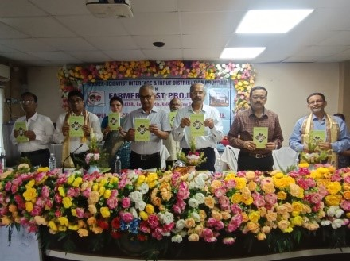1 September 2025, Haringhata, Nadia
A Farmer–Scientist Interface and Input Distribution Programme was organized at Haringhata by the West Bengal University of Animal and Fishery Sciences (WBUAFS) in collaboration with ICAR-Agricultural Technology Application Research Institute, Kolkata, under the Farmer FIRST Programme (FFP). The initiative aimed at strengthening rural livelihoods through science-led interventions in animal husbandry and allied sectors.
Inaugurating the programme, Dr. Tirtha Kumar Dutta, Vice-Chancellor, WBUAFS, emphasized the need to boost the incomes of marginal farmers, particularly women, through scientific training and input support in animal husbandry and fishery.
Dr. Pradip Dey, Director, ICAR-ATARI, Kolkata, highlighted that the FFP bridges the gap between farmers and scientists by promoting community-driven pathways that integrate viable technologies, empower women, strengthen feedback-based learning, and build market linkages for sustainable livelihood security.
Other dignitaries who addressed the gathering included Prof. B. K. Sil, Director, DREF; Prof. Partha Das, Registrar, WBUAFS; and Smt. Mahasweta Biswas, BDO, Haringhata.

The event, held on the theme “Livelihood Empowerment through Scientific Animal Husbandry and Allied Intervention Modules,” brought together scientists, extension professionals, state officials, and progressive farmers on a common platform for knowledge exchange and technology dissemination.
As part of the programme, three villages Ayeshpur, Baksa, and Dakshin Dattapara were formally adopted. Baseline surveys covering over 1,000 farmers have already been completed in these villages, and an Action Plan (2025–26) has been prepared to address identified livelihood challenges.
To promote adoption at the grassroots, a range of critical inputs were distributed among farmers:
• 45 farm women and livestock farmers received Vanraja poultry birds, deworming medicines, vitamin-mineral mixtures, and fodder seeds.
• 15 fish farmers received lime for pond purification.
• 15 dairy farmers received improved fodder seeds.
• 70–80 households received vegetable seeds for developing nutrition gardens.
A major highlight of the programme was the release of two booklets and an animal rearing calendar in Bengali, providing farmers with practical guidance on scientific animal husbandry, livestock health management, and allied practices to enhance income and resilience.
(Source: ICAR- Agricultural Technology Application Research Institute, Kolkata)







फेसबुक पर लाइक करें
यूट्यूब पर सदस्यता लें
X पर फॉलो करना X
इंस्टाग्राम पर लाइक करें